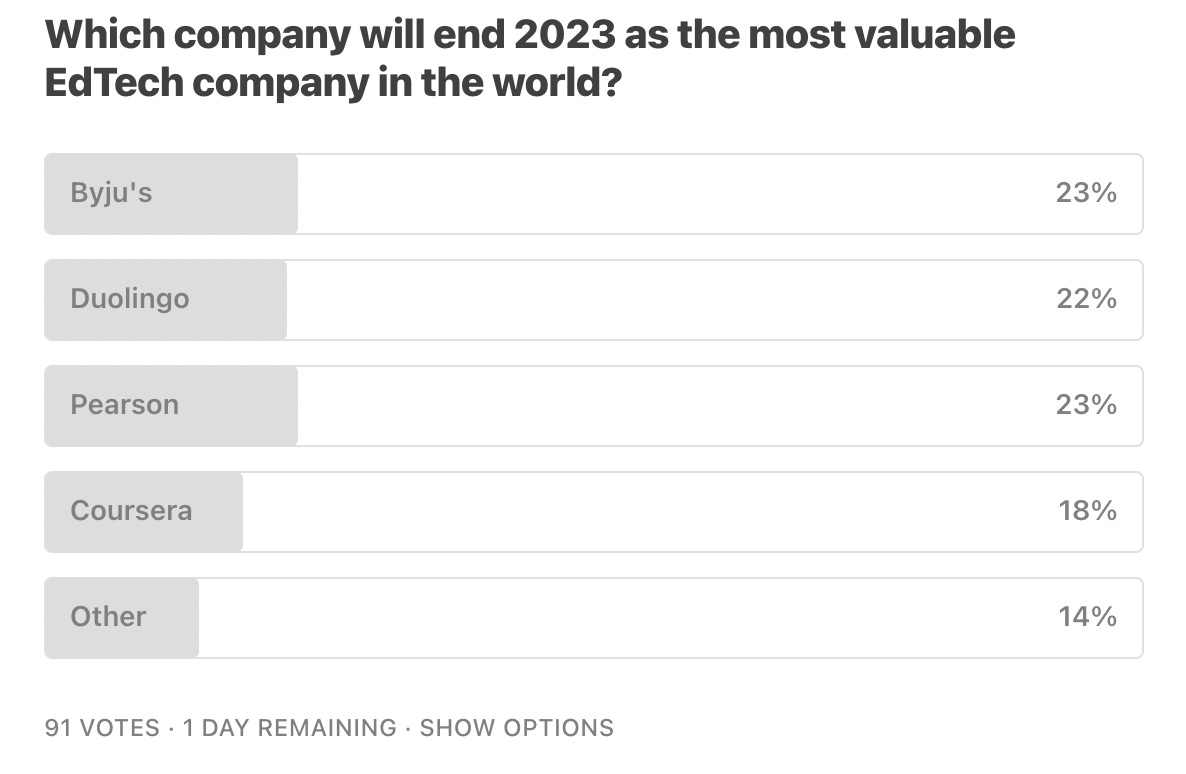Hello!
A short, but action-packed week, on to the news!
Funding / M&A
Dreamscape Learn raises $20M: Los Angeles-based Dreamscape Learn makes VR courseware for high school students. Hardware and software infrastructure from Big Tech companies like Meta and Unity have brought some production costs down, but making VR course assets remains more expensive than producing traditional courseware. Dreamscape is the latest example of a bet on a high-stakes but under-discussed question: Can the EdTech publishing market support a shift to A+ content at A+ prices or will affordability-focused courses leveraging Open Educational Resources (OER) win out? A sign of where the market *might* be shifting (or that costs are coming down faster than I was aware of) is Cengage’s involvement as an investor in this deal.
Arctic Shores raises ~$5.5M: Manchester-based Arctic Shores sells a psychometric hiring assessment to corporations. After writing about Equalture, a similar, Rotterdam-based company, Ryan Craig’s Gap Letter reminded me that the reason we see most of the experimentation in hiring assessments outside of the U.S. is the legal | precedent that they violate the U.S. Equal Employment Opportunity Commission rules. The rules are not distinctly against using assessments, but make the bar to adoption high. Roblox, via their 2020 acquisition of Imbellus, deserves credit for their attempts to buck this trend.
Elucidat raises ~$2.5M: Brighton-based Elucidat provides a platform and design templates for corporations to build learning and development content.
Noodle acquires Hubble Studios: Cape Town-based Hubble Studios is a content development agency that Noodle partnered with for multiple years prior to this acquisition. Noodle plans to use the acquisition to getsmarter about the international market, an area of strength for the Hubble team and where Noodle has not played much historically. Noodle’s press release also notes their new(ish) commitment to bringing more services in-house, something of a departure from the firm’s strategy of acting like a general contractor for higher ed institutions.
2022 EdTech funding landscape report: Not a funding itself, but a helpful overview from the folks at HolonIQ on trends from their proprietary database of EdTech funding events.
Story
It’s really hard to be a teenager today
My mom likes to joke that her favorite birthday of mine was my 26th, because that was the point when my brain was fully developed and she was no longer responsible for my decisions.1
I spent a lot of time thinking about that this week as I wrestled with two seemingly-at-odds pieces by Jomayra Herrera and Katherine Boyle.
Jomayra argues that it has never been more challenging to be an adolescent. The entire history of the world is at your fingertips, yet the internet never seems to agree on anything. You can try as many communities as you like, but it is hard to know where you stand in any of them. Everything you do is monitored in some way/shape/form and hosted in perpetuity. The result is that it ends up taking longer to form a sense of self than previous, analog-limited generations.2
Katherine argues that infantilizing our twenty-somethings (and early thirty-somethings) is impeding our ability to progress as a country. Instead of the natural wresting of power from the boomer gerotocracy, millenials and Gen Z are content to let the cards fall as they may while posting their morning routines on TikTok.
I believe both are right. We need to encourage, in Katherine’s words, “seriousness” among twenty-somethings. To do so requires acknowledging, and designing for, everything in Jomayra’s essay — like Finland and New Jersey are attempting with their media literacy initiatives.
Today’s world can be a hellscape. I get why it can take 30+ years for a person to come to grips with their role in it. But I’m hopeful that new solutions, public and private, will emerge to show today’s adolescents that there are also amazing opportunities for progress.
Asks
I am looking for beta-testers for an EdTech-focused job board. If you are hiring or job-seeking, please reach out!
If you have an Ask you’d like to see published in a future EdTech Thoughts, please fill out this form.
Links
God. Family. Country. And Ice Cream Trucks
High Point University does not have a lazy river. But it does have an ice cream truck. And a steak house. And heated outdoor swimming pools (plural), a concierge, car washes, a replica Wall Street trading floor, movie theater, arcade, innovators-in-residence like Steve Wozniak, “tiny house” dorms (for a $17K additional fee), and a Director of Wow.
It also tripled enrollment over the past fifteen years and has one of the highest operating margins in the country: 28% compared to the national median of 1.8%.
There are a lot of easy reasons to be uncomfortable with and disregard the High Point story. But there are some important lessons about customer acquisition and differentiation to be taken from from one of very few regional growth stories in US Higher Education.
“This sector belongs to India”
Byju’s eponymous founder was interviewed by CNBC’s Shereen Bhan at Davos. Interviews with the leaders of non-public companies are usually pretty shallow; this was one of the toughest broadly-shared ones I’ve seen.3 I thought Byju acquitted himself well, balancing transparency and humility over past mistakes with long-term confidence in his business and the EdTech market. And generally avoiding making the conversation too combative.
SNHU and Stride partner to provide dual-credit pathways to Stride students
It’s possible this was a one-off. Stride started promoting dual enrollment as a differentiator in 2021 and I expect them to continue leaning into it as a post-pandemic growth strategy. SNHU provides a reliable, scaled partner to execute this. I am more curious if this partnership also signals a strategic shift for SNHU. This is the second public acknowledgement that SNHU is spending more time enrolling traditional undergraduate students. I wonder if the adult learner market - SNHU’s core online market for the past decade - has finally gotten so competitive that the university is starting to look elsewhere for growth.
Parents Rethinking K12 Education
There were two big K12 surveys that came out this week - one from National School Choice Week (NSCW) and one from a non-profit call Populace. The results are interesting, but didn’t quite pass the sniff test to me. The NSCW survey included questions like “At any point in the past year, did you think about, consider, search for, or choose a new or different school or learning environment for any of the school-aged children in your household?” and “Do you think that your community offers the right number of schooling options for parents to consider for their children, not enough options, or too many options?” To me, questions like that are far too vague to draw a conclusion from.
The Populace survey was slightly more specific, but involved stack-ranking preferences. Stack ranks are interesting! But I’m not sure being low in a stack is the same as saying something is not important.
Question of the Week
Note: votes are anonymous
Results of last week’s question: For what it’s worth, I think there are compelling arguments for and against every option listed here. My money would probably be on Byju’s because 1) they are starting with almost 3X the valuation ($22B) of any other EdTech company and 2) they do not have to compete with the vicissitudes of the public markets.
Ed Tech Thoughts is a short ( ~ 5 mins), weekly overview of the top stories in EdTech, with a few (hopefully interesting) gut reactions attached. If you enjoyed this edition, I hope you will subscribe and/or forward to your friends!
If I missed something, or there is a topic you’d like to learn more about, I encourage you to submit a story! Submissions can be named or anonymous
Disclosure
My mom and I have a great relationship, this is a joke among education nerds!
Millennials are sort of betwixt-and-between here. As a millennial, my point-of-view is that we got to experience many of the features of the internet without as many of the social costs of making mistakes. Scammers and trolls existed, but weren’t as sophisticated and pervasive as they are today. Being a teenager in 2023 is harder than it was in the 2000s and 2010s.
I put public company executive interviews in a different - much more challenging - category because interviewers have so much more information to work with and executives have a stronger obligation to answer tough questions.







Great stuff Matthew. Enjoying each new edition of this publication.